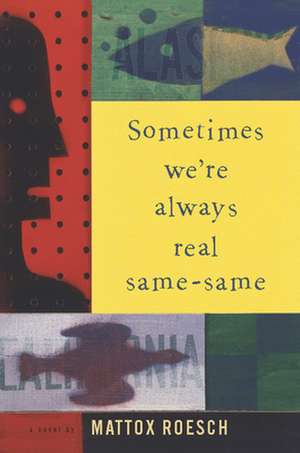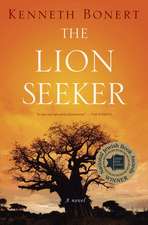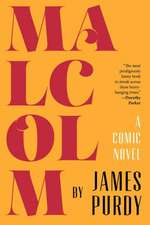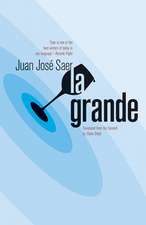Sometimes We're Always Real Same-Same
Autor Mattox Roeschen Limba Engleză Paperback – 31 aug 2009 – vârsta de la 14 până la 18 ani
Preț: 96.47 lei
Nou
Puncte Express: 145
Preț estimativ în valută:
18.47€ • 20.06$ • 15.52£
18.47€ • 20.06$ • 15.52£
Carte disponibilă
Livrare economică 31 martie-14 aprilie
Preluare comenzi: 021 569.72.76
Specificații
ISBN-13: 9781932961874
ISBN-10: 1932961879
Pagini: 317
Dimensiuni: 150 x 226 x 23 mm
Greutate: 0.46 kg
Editura: Unbridled Books
ISBN-10: 1932961879
Pagini: 317
Dimensiuni: 150 x 226 x 23 mm
Greutate: 0.46 kg
Editura: Unbridled Books
Recenzii
“Thoughtful…[Roesch] delivers.”—The New York Times Book Review
"Refreshingly honest ... masterful... Roesch draws the reader closer and closer to his tightly knit characters and the community that binds them. A totally engaging first novel...and completely unique."—Booklist
"What makes this book good is its subtle rendering of village life as a web of relationships that sustain individual and community in a harsh environment. Yet because the characters are so well imagined, it does so without becoming a sociological diorama . . . “Same-Same" is a quirky and endearing first novel." —The Star Tribune
"The deep and universal desire for connectedness is explored here in stunningly original ways that speak to us all. An exciting debut by one of America’s finest young writers.”
—Robert Olen Butler
“To his credit, Roesch deftly avoids clichés such as “walks in two worlds” or passages about Cesar “reclaiming” his heritage…. [and] gives us a version of rural Alaska that we can smell, feel, hear and see. It’s fresh….captivat[ing].”—Anchorage Press
"A smashing debut…full of beauty, wisdom, and grace."—Sigrid Nunez
“Sometimes We’re Always Real Same-Same” is the coming-of-age story of a young transplant to the village and explores the painful transition from adolescence to adulthood, the differences between religious and spiritual truths, and the nature of mental illness. It also takes up that age-old question of whether or not the people who we think are crazy might be the sanest among us. It’s an ambitious project, and Roesch handles it ably….This is a tightly written, well thought out book...memorable.”—Fairbanks Daily Miner
“Riveting.”—PopMatters.com
“Teens will enjoy the likeable Cesar’s informal laid-back voice and dialogue.”—Pennsylvania School Library Association
Descriere
He’s in the middle of nowhere, Alaska, because his Eskimo mother has moved home, and Cesar, a seventeen-year-old former gang banger, is convinced that he’s just biding his time ‘til he can get back to LA. His charmingly offbeat cousin, Go-boy, is equally convinced that Cesar will stay. And so they set a wager. If Cesar is still in Unalakleet in a year, he has to get a copy of Go-boy’s Eskimo Jesus tattoo.
Go-boy, who recently dropped out of college, believes wholeheartedly that he is part of a Good World conspiracy. At first Cesar considers Go-boy half crazy, but over time in this village, with his father absent and his brother in jail for murder, Cesar begins to see the beauty and hope Go-boy represents. The choice.
This is a novel about a different Alaska than many of us have read about in the past, about a different kind of wilderness and survival. As Cesar (who later assumes his Eskimo name, Atausiq) becomes connected to the community and to Go-boy, the imprint he bears isn’t Go-boy’s tattoo but the indelible mark of Go-boy’s heart and philosophy, a philosophy of hope that emphasizes our similarities to one another as well as a shared sense of community, regardless of place. As Go-boy says to Cesar, “Sometimes we’re always real same-same.”
Go-boy, who recently dropped out of college, believes wholeheartedly that he is part of a Good World conspiracy. At first Cesar considers Go-boy half crazy, but over time in this village, with his father absent and his brother in jail for murder, Cesar begins to see the beauty and hope Go-boy represents. The choice.
This is a novel about a different Alaska than many of us have read about in the past, about a different kind of wilderness and survival. As Cesar (who later assumes his Eskimo name, Atausiq) becomes connected to the community and to Go-boy, the imprint he bears isn’t Go-boy’s tattoo but the indelible mark of Go-boy’s heart and philosophy, a philosophy of hope that emphasizes our similarities to one another as well as a shared sense of community, regardless of place. As Go-boy says to Cesar, “Sometimes we’re always real same-same.”














